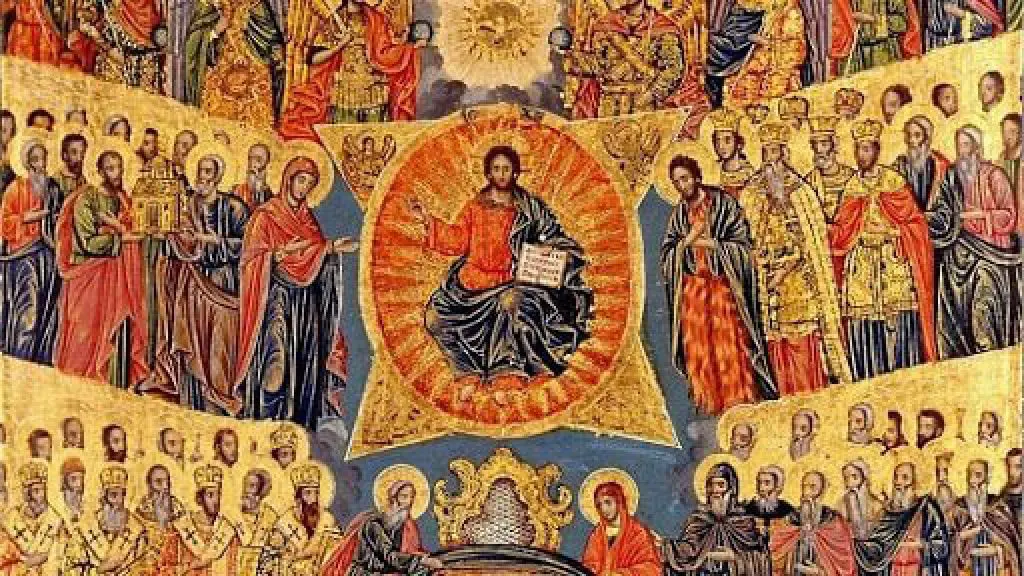It is true that the spirit is the first and basic principle of Christianity, but at the same time we must add that it perceives this spirit in a completely different way from idealism. We emphasized from the beginning that the content of Christianity is the fruit of revelation, which means that its teaching on the spirit has the same character. Unlike idealism, revelation does not speak of a spirit at all, but of the Holy Spirit. To avoid some misunderstandings, here is his place to make a clarification. When we speak of the Holy Spirit, we do not mean specifically the theological distinction in the very existence of God, expressed in the idea of the trinity. By the Holy Spirit we understand the essence of God as a Spirit in general, opposite to the idealistic spirit, and in order to express this opposition more clearly and emphatically, we use the adjective holy, which in its sense is most appropriate for this purpose. The adjective saint reproduces in Bulgarian the Greek word ἅγιος, which is a translation of the Hebrew qadosh. The word qadosh in the Bible denotes difference, division, ie in general something that is radically different from this world, something that is beyond the world and completely opposite to the earthly or profane. The sacred manifests empirically in the temporal-spatial world as a fire that burns everything in contact with it, or as a light that blinds. Characteristic in this respect are the experiences of Moses at the burning bush on Mount Horeb (Ex. 3: 1-5) and ap. Paul at his meeting with Christ at the gates of Damascus (Acts 9: 3-9). From the concept of light originates the Slavic adjective “shines”, which means inaccessibility, absolute extraterrestrialism and transcendence not as an abstract idea, but as a dynamic manifestation. In holiness we therefore have the self-distinction of God from everything outside of Him. The awareness of the sacred was especially strong in the biblical prophets: Isaiah experienced the holiness of God as the mortal opposite of his own created nature. [2] The most subtle analysis of the sacred was given by the German scientist Rudolf Otto. [3] According to him, it represents a specific religious category, which can be expressed by the scientific Latin terms “mysterium tremendum et fascinans”. The word mysterium characterizes the sacred as an objective reality that does not belong to this world. It is something mysterious because it cannot be clarified as a world-immanent phenomenon. In order to make a clear distinction, we must emphasize that here secret is not understood as something unknown, vague and as yet unexplored, which with the progress of science will be known and mastered. Positivism builds its theory on such a notion of mystery. According to him, religion is a primitive and naive notion that rests on the first man’s fear of the mystery of natural phenomena, because he did not yet know their true causes. With the advent of scientific knowledge, this mystery gradually diminishes, and with it, religion will disappear. However, Rudolf Otto uses the word secret not as ambiguity and unfamiliarity with the natural phenomena that take place in this world. It does not mean a lack of knowledge that can be filled over time. A secret for him is that which has nothing to do with this world and is beyond its borders. It is something extraterrestrial, transcendent, which does not go beyond scientific research and therefore can never be overcome by it. It is true that primitive man first mixed the sacred he experienced with natural phenomena themselves due to insufficient knowledge of their causes. This does not mean that once he has scientifically clarified these reasons, the sacred has ceased to exist for him. Science has only corrected the error of primitive man in interpreting the sacred, but it has not destroyed the latter. Therefore, religion as an encounter with the sacred is not a temporary period in the development of mankind, but is a quantity parallel to science. One is focused on the extraterrestrial and the other on the immanent, with the two only clarifying their boundaries over time. For clarity, Rudolf Otto translates the word mysterium with something completely different (das ganz Andere), which shines in this world, but in its essence remains outside it. The other two Latin terms “tremendum et fascinans” express the effect that the sacred has on the human consciousness when it meets it. “Tremendum” comes from the verb tremor, which means to tremble, I’m afraid. The first reaction, therefore, which the sacred provokes in man, is trembling or fear. Man feels that he has come into contact with something mysterious, unearthly, radically different from the reality around him, something completely foreign to him, which fundamentally shakes his existence and threatens his security in the world. As before, so now we have to make another distinction. The fear or awe of the sacred is completely different from the similar states we experience in ordinary life. Other cultural languages have a large enough vocabulary to express this subtle difference; in Bulgarian, however, we do not have this opportunity and therefore we will be satisfied only with comparisons and explanations.
N.B. For the first time this text by KONSTANTIN TSITSELKOV was published in the magazine Spiritual Culture, vol. 6, 1949, pp. 12-23.






